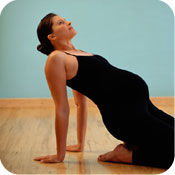
Many of us have a great pre-workout and workout routine. You drink plenty of water beforehand and during, warm-up, stretch, work our entire body or focus on a certain area, even get in some cardiovascular training as well. You've done it by the book. No jerky movements, no dangerous machines or positions. You've done everything you can to protect your baby. Then after the last exercise, you promptly head back to the locker room, change and head home. But you might actually be doing you and your baby harm.
What many women and pregnant women out there do not realize is the importance of what you do after you workout. The majority of the work may be done, but the training doesn't stop there. How you treat your body the minutes and hours after you exercise is in direct relation to muscle soreness, muscle strength and growth, and staying hydrated. And of course, still take all of the safety precautions that you did during the first part of the workout.
The first thing you want to do is cool down. Even if brisk walking was all you did, light cardio for a few minutes is a good idea. This brings your heart rate down at a slow and steady pace, allowing you to feel better, instead of experiencing sickness for minutes or even hours after a workout. (During pregnancy, you should not rely on heart rate to judge how hard you're working. You should be using the Rate of Perceived Exertion (RPE) Scale, also called the Modified Borg Scale.) If you simply stop, your blood pressure might drop too quickly, causing you to feel dizzy or even blackout. Walking on a treadmill for five minutes is a good and easy way to cool down. Body temperature rises while working out, and it's important to bring it back to a safe resting temperature.
It is essential to stretch the muscles after you are done as well. Following a workout, muscles naturally contract. Stretching again prevents them from shrinking and allows them to rebuild and grow bigger and stronger, thus getting the full benefit from your efforts. Just be careful not to overextend any muscles or joints. The connective tissue become more lax during pregnancy, so it becomes easier to hurt a joint. If it starts to hurt, you've gone too far.
Stretching after exercise also relaxes your muscles, helps circulation to joints and tissues, and helps with the removal of unwanted waste products. This all helps in reducing muscle soreness and stiffness. Add improved circulation, mental sharpness, and better balance while pregnant, and you have all the reason you need to make sure stretching comes not only before, but after, every workout.
Continued ›
| 

.jpg)



Member Comments